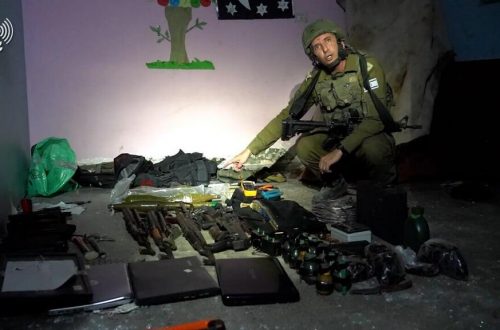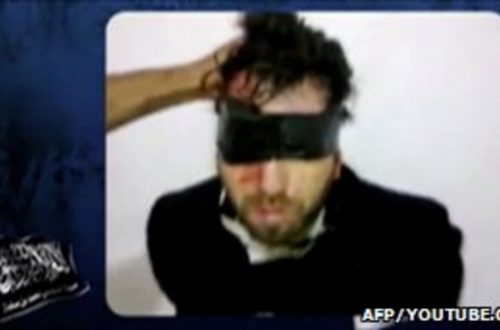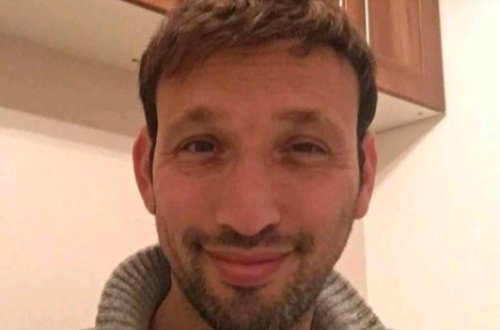This is a Cross Post from the OneVoice Movement
OneVoice Palestine’s (OVP) Mohammad Asideh and OneVoice Israel’s (OVI) Eliran Eyal give a human face to a conflict defined by headlines.
Speaking with Mohammad, one can’t help but get caught up in the air of altruism he exudes. Mohammad, 23, is from the village of Til, near the West Bank city of Nablus. He graduated from An-Najah National University in Nablus with a bachelor’s degree in political science and aspires to enter regional politics. After giving up early childhood dreams of becoming a Palestinian soccer player, he has made it his mission to make sure that future generations of soccer playing youth have a national team for which to try out.
Mohammad has made the future generations of Palestine the focal point of both his civic service and personal life. His time is dedicated to a number of organizations geared toward improving the lifestyles of Palestinian youth, as well as sharing the responsibility of looking after his three younger brothers and sister. Besides serving as president of OVP’s Youth Council, Mohammad is an active volunteer in the Tomorrow’s Youth Organization refugee camps based in Nablus, as well as being a “Peace Pioneer” for Generations of Peace.
“I like to help children work through the tough experiences they’ve encountered,” he says. “There are so many opportunities in this world that I don’t want children in Palestine to be without, and I wish for them to take advantage of the opportunities I lacked. I want whatever they dream to be within the grasp of reality.”
It is clear that Mohammad is grateful for his role at OneVoice, and takes pride in the fact that he and his fellow OVP Nablus chapter members feel like, “We’re a big family. When I go to [An-Najah] university, we all sit together. Other students know us and that we are from OneVoice,” he states.
Mohammad has found OVP to be a suitable platform from which he can not only effect positive change for the Palestinian people, but nurture his political aspirations as well. His interest in politics stems from an incident in 1998, when the Palestinian Authority rounded up about 45 men, four of which were his cousins, and charged them with supporting opposition leaders. An 11-year-old Mohammad frequently visited his jailed family members and listened to the relentless political conversations that took place from the other side of the bars. The enthusiasm for civic action captured in that cell spread to Mohammad much in the same way he hopes to encourage others to prepare for the future.
“It is very important for an organization like OneVoice to say what needs to be said. We’re not a political party. Our job is not to change minds, but to get people thinking about the future and coming to their own conclusions,” he explains.
The idea of focusing on the future instead of clinging to the past is paramount to the philosophy of both OneVoice members and its programs. This is none the more prevalent than in OneVoice’s Imagine 2018 campaign, aimed to create a more future-oriented discourse among the grassroots. Israelis and Palestinians are being asked to envision what the future will look like if there is a peace agreement versus maintaining the toxic status quo or worse.
“I think the 2018 campaign is very important because it asks people to think about a solution,” he adds. “My vision is for Palestine to become a free democratic state with a healthy economy, airport, and of course, a soccer team.”
Eliran Eyal, 29, is a professional stage actor, writer, and theater production manager who stumbled upon OVI by chance. On the suggestion of a friend, Eliran attended a town hall meeting (THM) to conduct research for a play he was writing about the consequences of war on an Israeli solider. From there, it was only a matter of time until the Beit Zvi acting school graduate and Ramat Gan native became a full fledged youth leader.
You’ll find your mood synchronously improve as a conversation with Eliran progresses. His animated personality is what you would expect from someone entrenched in Tel Aviv’s theater world. The evolvement of Israel’s cultural scene is what drives Eliran to work toward an end to the conflict. His philosophy, simply put, is that the establishment of an independent Palestinian state equals a more secure Israel, requiring less money toward its defense and security, and more toward civic and social development.
Eliran joined OVI after learning the results of a OneVoice sponsored poll about the desire of peace amongst the general Israeli and Palestinian populations. “I was shocked to learn that nearly three quarters of Palestinians wanted peace, and I felt like up until then I had been living a lie. From what I had heard in the media my whole life, I thought that the majority of Palestinians wanted to destroy the Jewish people. Being at the THM was the first time in my life that I understood we had a partner on the other side,” he said.
Like most Israelis, Eliran grew up with the understanding that he was without a partner in peace. He cites, among his childhood memories, learning the quickest way to put on a gasmask, and long nights watching television from the confines of a bomb shelter during the first and second intifadas [uprisings]. The conflict, in effect, had robbed him of his youth.
“For Purim one year, I remember dressing up as The Kurgan from the movie Highlander,” he recalls. “I was wearing full leather and had shaved my head so that my friend could draw this really cool dragon on the side. It looked awesome. I was so excited to go out and show it off until it was reported on the news that a suicide bomber had just killed himself and others in Tel Aviv. I went in the bathroom to clean my face, suddenly feeling so naïve and stupid. I thought, ‘how could I dare choose to go out and have fun with my friends when there are people whose families had just been destroyed?’”
This experience is similar to one Eliran had the day Israeli Prime Minister Yitzhak Rabin was assassinated on November 4, 1995.
“Rabin’s assassination is something that I think I will never forget. My family and I were together in a large banquet hall celebrating my cousin’s bat mitzvah when it happened. For the most part everyone was dancing and having a good time. When it was first announced that he had been shot, some of the men went to watch what was happening on a TV in a backroom. When it was finally revealed that he died, the mood quickly turned somber and everyone left the party. I remember feeling bad for not crying despite seeing the tears of everyone around me. I didn’t understand the gravity of the situation at the time. Despite Yasser Arafat’s condemnation of the tragedy, I felt angry toward Arabs broadcast on the news who were celebrating his death. That instance was an example of the media using its power to deepen the divide, rather than working to unify people.”
One of the things that most impressed Eliran about OVI is its subversion to the common media tactic of fear mongering. As one of OVI’s most enthusiastic youth leaders, Eliran works hard in his community to facilitate the flow of open dialogue between Israelis and Palestinians. “I know my audience now,” he says. “Both Israelis and Palestinians wants an agreement that will ensure they live next to each other.”
___________________________________________
If you are intrested in becoming a member of the movement in the UK please email OneVoice Europe at europe@onevoicemovement.org.uk


